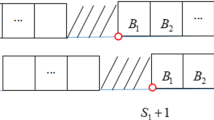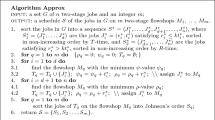Abstract
This paper addresses the performance of scheduling algorithms for a two-stage no-wait hybrid flowshop environment with inter-stage flexibility, where there exist several parallel machines at each stage. Each job, composed of two operations, must be processed from start to completion without any interruption either on or between the two stages. For each job, the total processing time of its two operations is fixed, and the stage-1 operation is divided into two sub-parts: an obligatory part and an optional part (which is to be determined by a solution), with a constraint that no optional part of a job can be processed in parallel with an idleness of any stage-2 machine. The objective is to minimize the makespan. We prove that even for the special case with only one machine at each stage, this problem is strongly NP-hard. For the case with one machine at stage 1 and m machines at stage 2, we propose two polynomial time approximation algorithms with worst case ratio of \(3-\frac{2}{m+1}\) and \(2-\frac{1}{m+1}\), respectively. For the case with m machines at stage 1 and one machine at stage 2, we propose a polynomial time approximation algorithm with worst case ratio of 2. We also prove that all the worst case ratios are tight.











Similar content being viewed by others
References
Augusto V, Xie X, Perdomo V (2010) Operating theatre scheduling with patient recovery in both operating rooms and recovery beds. Comput Ind Eng 58(2):231–238
Blake J, Carter M (1997) Surgical process scheduling: a structured review. J Soc Health Syst 5(3):17–30
Cardoen B, Demeulemeester E, Beliën J (2010) Operating room planning and scheduling. Eur J Oper Res 201(3):921–932
Chen B (1995) Analysis of classes of heuristics for scheduling two-stage flow shop with parallel machines at one stage. J Oper Res Soc 46(2):234–244
Chen B, Potts CN, Woeginger GJ (1998) A review of machine scheduling: complexity, algorithms and approximability, In: Handbook of combinatorial optimization, vol 3. Kluwer Academic Publisher, Boston, pp 21–169
Cheng TCE, Liu Z (2003) Approximability of two-machine no-wait flowshop scheduling with availability constraints. Oper Res Lett 31(4):319–322
Cheng TCE, Sriskandarajah C, Wang G (2000) Two- and three-stage flowshop scheduling with no-wait in process. Prod Oper Manag 9(4):367–378
Garey MR, Johnson DS (1979) Computers and intractability: a guide to the theory of NP-completeness. Freeman, New York
Glass CA, Gupta JND, Potts CN (1999) Two machine no-wait flowshop scheduling with missing operations. Math Oper Res 24(4):911–924
Gilmore P, Gomory R (1964) Sequencing a one-state variable machine: a solvable case of the travelling salesman problem. Oper Res 12(5):665–679
Gilmore P, Lawler EL, Shmoys DB (1985) Well-solved specail cases. In: Lawler EL et al (eds) The travelling salesman problem: a guided tour of combinatorial optimization. Wiley, Chichester, pp 87–143
Guerriero F, Guido R (2011) Operational research in the management of the operating theatre: a survey. Health Care Manag Sci 14(1):89–114
Gupta JND (1988) Two-stage hybrid flowshop scheduling problem. J Oper Res Soc 39(4):359–364
Gupta JND, Tunc EA (1991) Schedules for a two-stage hybrid flowshop with parallel machines at the second stage. Int J Prod Res 29(7):1489–1502
Hall NG, Sriskandarajah C (1996) A survey of machine scheduling problems with blocking and no-wait in process. Oper Res 44(3):510–525
Lee C-Y, Cheng TCE, Lin BMT (1993) Minimizing the makespan in the 3-machine assembly-type flowshop scheduling problem. Manage Sci 39(5):616–625
Lin BMT, Cheng TCE (2001) Batch scheduling in the no-wait two-machine flowshop to minimize the makespan. Comput Oper Res 28(7):613–624
Liu Y, Chu C, Wang K (2011) A new heuristic algorithm for the operating room scheduling problem. Comput Ind Eng 61(3):865–871
Magerlein J, Martin J (1978) Surgical demand scheduling: a review. Health Serv Res 13(4):418–433
Meskens N, Duvivier D, Hanset A (2013) Multi-objective operating room scheduling considering desiderata of the surgical team. Decis Support Syst 55(2):650–659
Potts CN, Sevastjanov SV, Strusevich VA, van Wassenhove LN, Zwaneveld CM (1995) The two-stage assembly scheduling problem: complexity and approximation. Oper Res 43(2):346–355
Przasnyski Z (1986) Operating room scheduling. AORN J 44(1):67–82
Ruiz R, Vázquez-Rodríguez JA (2010) The hybrid flow shop scheduling problem. Eur J Oper Res 205(1):1–18
Schmid V, Doerner KF (2013) Examination and operating room scheduling including optimization of intrahospital routing. Transp Sci 48(1):59–77
Sevastianov SV (2002) Geometrical heuristics for multiprocessor flowshop scheduling with uniform machines at each stage. J Sched 5:205–225
Shabtay D, Kaspi M, Steiner G (2007) The no-wait two-machine flow shop scheduling problem with convex resource-dependent processing times. IIE Trans 39(5):539–557
Sriskandarajah C, Ladet P (1986) Some no-wait shops scheduling problems: complexity aspect. Eur J Oper Res 24(3):424–438
Sriskandarajah C (1993) Performance of scheduling algorithms for no-wait flowshops with parallel machines. Eur J Oper Res 70(3):365–378
Sriskandarajah C, Sethi SP (1989) Scheduling algorithms for flexible flowshops: worst and average case performance. Eur J Oper Res 43(2):143–160
Veltman B (1993) Multiprocessor scheduling with communication delays. PhD thesis, CWI, Amsterdam, The Netherlands
Xie J, Xing W, Lin Z, Dong J (2004) Minimum deviation algorithm for two-stage no-wait flowshops with parallel machines. Comput Math Appl 47(12):1857–1863
Acknowledgements
We are grateful to the anonymous referees and associate editor who have helped to enrich the contents and improve the presentation of our work.
Author information
Authors and Affiliations
Corresponding author
Additional information
The first author was supported by the National Natural Science Foundation of China Grants (No. 11301327, 11571221).
Rights and permissions
About this article
Cite this article
Zhong, W., Shi, Y. Two-stage no-wait hybrid flowshop scheduling with inter-stage flexibility. J Comb Optim 35, 108–125 (2018). https://doi.org/10.1007/s10878-017-0155-8
Published:
Issue Date:
DOI: https://doi.org/10.1007/s10878-017-0155-8




